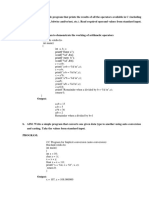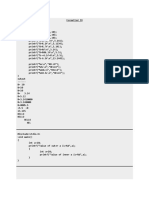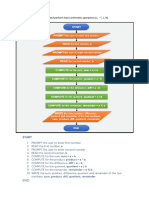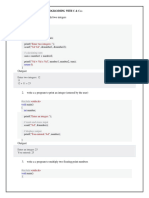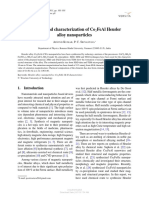0% found this document useful (0 votes)
150 views41 pagesC Codes For Student
The document contains C code examples for various programming concepts:
1) The first section contains code to find the largest and smallest of three numbers using if/else statements and ternary operators.
2) Subsequent sections include code samples for bitwise operators, the sizeof operator, switch statements, number conversions between decimal, binary, octal and hexadecimal, and checks for Armstrong, Krishnamurti, and palindrome numbers.
3) The document appears to be lecture notes that provide C code examples for foundational programming concepts for learning purposes.
Uploaded by
Suvadeep DuttaCopyright
© © All Rights Reserved
We take content rights seriously. If you suspect this is your content, claim it here.
Available Formats
Download as PDF, TXT or read online on Scribd
0% found this document useful (0 votes)
150 views41 pagesC Codes For Student
The document contains C code examples for various programming concepts:
1) The first section contains code to find the largest and smallest of three numbers using if/else statements and ternary operators.
2) Subsequent sections include code samples for bitwise operators, the sizeof operator, switch statements, number conversions between decimal, binary, octal and hexadecimal, and checks for Armstrong, Krishnamurti, and palindrome numbers.
3) The document appears to be lecture notes that provide C code examples for foundational programming concepts for learning purposes.
Uploaded by
Suvadeep DuttaCopyright
© © All Rights Reserved
We take content rights seriously. If you suspect this is your content, claim it here.
Available Formats
Download as PDF, TXT or read online on Scribd
/ 41







